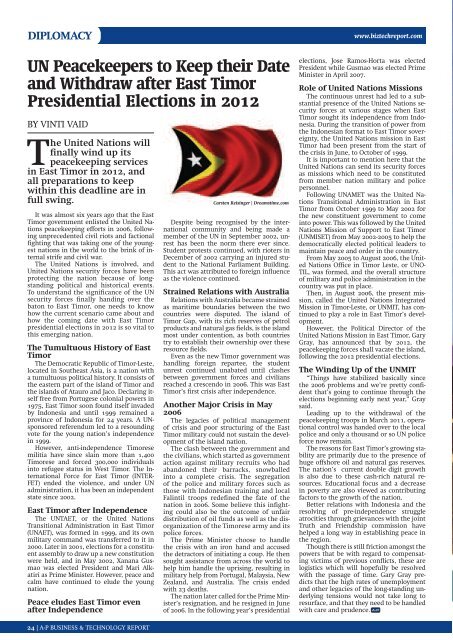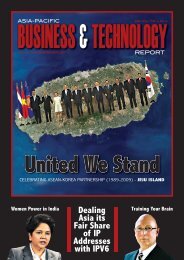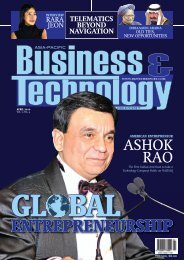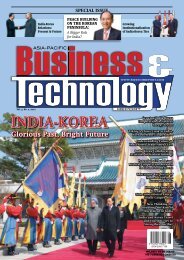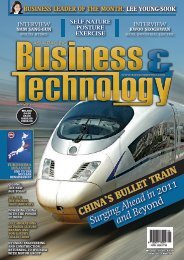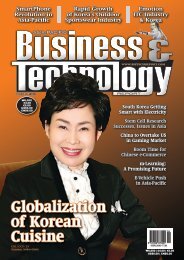GreeN Growth - Asia-Pacific Business and Technology Report
GreeN Growth - Asia-Pacific Business and Technology Report
GreeN Growth - Asia-Pacific Business and Technology Report
- No tags were found...
Create successful ePaper yourself
Turn your PDF publications into a flip-book with our unique Google optimized e-Paper software.
diplomacyUN Peacekeepers to Keep their Date<strong>and</strong> Withdraw after East TimorPresidential Elections in 2012By Vinti VaidThe United Nations willfinally wind up itspeacekeeping servicesin East Timor in 2012, <strong>and</strong>all preparations to keepwithin this deadline are infull swing.It was almost six years ago that the EastTimor government enlisted the United Nationspeacekeeping efforts in 2006, followingunprecedented civil riots <strong>and</strong> factionalfighting that was taking one of the youngestnations in the world to the brink of internalstrife <strong>and</strong> civil war.The United Nations is involved, <strong>and</strong>United Nations security forces have beenprotecting the nation because of longst<strong>and</strong>ingpolitical <strong>and</strong> historical events.To underst<strong>and</strong> the significance of the UNsecurity forces finally h<strong>and</strong>ing over thebaton to East Timor, one needs to knowhow the current scenario came about <strong>and</strong>how the coming date with East Timorpresidential elections in 2012 is so vital tothis emerging nation.The Tumultuous History of EastTimorThe Democratic Republic of Timor-Leste,located in Southeast <strong>Asia</strong>, is a nation witha tumultuous political history. It consists ofthe eastern part of the isl<strong>and</strong> of Timor <strong>and</strong>the isl<strong>and</strong>s of Atauro <strong>and</strong> Jaco. Declaring itselffree from Portugese colonial powers in1975, East Timor soon found itself invadedby Indonesia <strong>and</strong> until 1999 remained aprovince of Indonesia for 24 years. A UNsponsoredreferendum led to a resoundingvote for the young nation’s independencein 1999.However, anti-independence Timoresemilitia have since slain more than 1,400Timorese <strong>and</strong> forced 300,000 individualsinto refugee status in West Timor. The InternationalForce for East Timor (INTER-FET) ended the violence, <strong>and</strong> under UNadministration, it has been an independentstate since 2002.East Timor after IndependenceThe UNTAET, or the United NationsTransitional Administration in East Timor(UNAET), was formed in 1999, <strong>and</strong> its ownmilitary comm<strong>and</strong> was transferred to it in2000. Later in 2001, elections for a constituentassembly to draw up a new constitutionwere held, <strong>and</strong> in May 2002, Xanana Gusmaowas elected President <strong>and</strong> Mari Alkatirias Prime Minister. However, peace <strong>and</strong>calm have continued to elude the youngnation.Peace eludes East Timor evenafter IndependenceCarsten Reisinger | Dreamstime.comDespite being recognised by the internationalcommunity <strong>and</strong> being made amember of the UN in September 2002, unresthas been the norm there ever since.Student protests continued, with rioters inDecember of 2002 carrying an injured studentto the National Parliament Building.This act was attributed to foreign influenceas the violence continued.Strained Relations with AustraliaRelations with Australia became strainedas maritime boundaries between the twocountries were disputed. The isl<strong>and</strong> ofTimor Gap, with its rich reserves of petrolproducts <strong>and</strong> natural gas fields, is the isl<strong>and</strong>most under contention, as both countriestry to establish their ownership over theseresource fields.Even as the new Timor government wash<strong>and</strong>ling foreign repartee, the studentunrest continued unabated until clashesbetween government forces <strong>and</strong> civiliansreached a crescendo in 2006. This was EastTimor’s first crisis after independence.Another Major Crisis in May2006The legacies of political managementof crisis <strong>and</strong> poor structuring of the EastTimor military could not sustain the developmentof the isl<strong>and</strong> nation.The clash between the government <strong>and</strong>the civilians, which started as governmentaction against military recruits who hadab<strong>and</strong>oned their barracks, snowballedinto a complete crisis. The segregationof the police <strong>and</strong> military forces such asthose with Indonesian training <strong>and</strong> localFalintil troops redefined the fate of thenation in 2006. Some believe this infightingcould also be the outcome of unfairdistribution of oil funds as well as the disorganizationof the Timorese army <strong>and</strong> itspolice forces.The Prime Minister choose to h<strong>and</strong>lethe crisis with an iron h<strong>and</strong> <strong>and</strong> accusedthe detractors of initiating a coup. He thensought assistance from across the world tohelp him h<strong>and</strong>le the uprising, resulting inmilitary help from Portugal, Malaysia, NewZeal<strong>and</strong>, <strong>and</strong> Australia. The crisis endedwith 23 deaths.The nation later called for the Prime Minister’sresignation, <strong>and</strong> he resigned in Juneof 2006. In the following year’s presidentialwww.biztechreport.comelections, Jose Ramos-Horta was electedPresident while Gusmao was elected PrimeMinister in April 2007.Role of United Nations MissionsThe continuous unrest had led to a substantialpresence of the United Nations securityforces at various stages when EastTimor sought its independence from Indonesia.During the transition of power fromthe Indonesian format to East Timor sovereignty,the United Nations mission in EastTimor had been present from the start ofthe crisis in June, to October of 1999.It is important to mention here that theUnited Nations can send its security forcesas missions which need to be constitutedfrom member nation military <strong>and</strong> policepersonnel.Following UNAMET was the United NationsTransitional Administration in EastTimor from October 1999 to May 2002 forthe new constituent government to comeinto power. This was followed by the UnitedNations Mission of Support to East Timor(UNMISET) from May 2002-2005 to help thedemocratically elected political leaders tomaintain peace <strong>and</strong> order in the country.From May 2005 to August 2006, the UnitedNations Office in Timor Leste, or UNO-TIL, was formed, <strong>and</strong> the overall structureof military <strong>and</strong> police administration in thecountry was put in place.Then, in August 2006, the present mission,called the United Nations IntegratedMission in Timor-Leste, or UNMIT, has continuedto play a role in East Timor’s development.However, the Political Director of theUnited Nations Mission in East Timor, GaryGray, has announced that by 2012, thepeacekeeping forces shall vacate the isl<strong>and</strong>,following the 2012 presidential elections.The Winding Up of the UNMIT“Things have stabilized basically sincethe 2006 problems <strong>and</strong> we’re pretty confidentthat’s going to continue through theelections beginning early next year,” Graysaid.Leading up to the withdrawal of thepeacekeeping troops in March 2011, operationalcontrol was h<strong>and</strong>ed over to the localpolice <strong>and</strong> only a thous<strong>and</strong> or so UN policeforce now remain.The reasons for East Timor’s growing stabilityare primarily due to the presence ofhuge offshore oil <strong>and</strong> natural gas reserves.The nation’s current double digit growthis also due to these cash-rich natural resources.Educational focus <strong>and</strong> a decreasein poverty are also viewed as contributingfactors to the growth of the nation.Better relations with Indonesia <strong>and</strong> theresolving of pre-independence struggleatrocities through grievances with the jointTruth <strong>and</strong> Friendship commission havehelped a long way in establishing peace inthe region.Though there is still friction amongst thepowers that be with regard to compensatingvictims of previous conflicts, these arelogistics which will hopefully be resolvedwith the passage of time. Gary Gray predictsthat the high rates of unemployment<strong>and</strong> other legacies of the long-st<strong>and</strong>ing underlyingtensions would not take long toresurface, <strong>and</strong> that they need to be h<strong>and</strong>ledwith care <strong>and</strong> prudence. A-P24 | A-P BUSINESS & TECHNOLOGY REPORT


